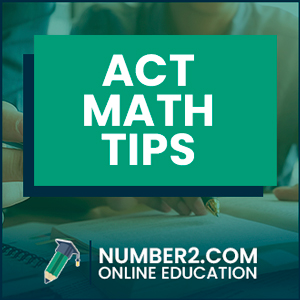 Strategies & Tactics to Ace the ACT Math Section Test
Strategies & Tactics to Ace the ACT Math Section Test
The ACT math section is often the second ACT test that students take. The Math test can be a bit nerve racking for students because of all the formulas, equations, and rules to remember and memorize, but don’t worry. You can make it.
Acing the math section really comes down to understanding the topics on the test, learning the types of problems that appear, and mastering the techniques that you will need to ace the Math ACT.
Let’s talk about some of the best tips for the ACT Math test and ways you can increase your ACT test score.
10 ACT Math Section Tips that You Need to Know
Here’s a list of the top 10 ACT Math tips to ace your ACT test and improve your score.
- Make Sure Your Calculator is ACT Approved
- Take Your Time
- Read the Entire Question
- Breakdown Word Problems
- Memorize Math Formulas
- Understand Triangles
- Know Your Ratios
- Memorize Math Properties
- Beware of Tricky Questions
- Don’t be Afraid to Guess
General ACT Math Tips
Tip #1: Make Sure Your Calculator is ACT Approved
The most important tip is to MAKE SURE you know your calculator is ACT approved BEFORE your test date. Tons of students arrive on their test day to realize that they aren’t allowed to use their calculator.
That’s not only a punch to the gut, it’s also a huge disadvantage trying to solve all of the math problems in your head. Make sure your calculator is approved.
Tip #2: Take Your Time
Rushing your test won’t help you. It will make you more anxious and will cause you to make senseless errors. Instead, plan your test out and give yourself a set number of seconds to read and review each question. That way you will be able to properly go through the exam thoroughly.
Tip #3: Read the Entire Question
This sounds like common sense, but it’s real. Read the WHOLE question. You might think you know what the question is asking you to solve just by skimming it or reading the first few words, but often times the question has twists and turns that you can’t find unless you read the entire thing.
Tip #4: Breakdown Word Problems
Practice reading word problems and translating them into math problems. The ACT test purposely words story problems confusingly, so you get messed up. Take your time and breakdown the paragraphs, sentences and, words into easy-to-understand pieces, so you can translate it into a solvable math problem.
Tip #5: Memorize Math Formulas
This tip should probably be higher on the list because it’s so crucial to memorize all the important Math ACT formulas. Understanding the equations isn’t enough. Memorize them, so you can recall any part of them in the middle of question.
Tip #6: Understand Triangles
Triangle geometry plays a big role in the Math ACT test, so understand your triangle angles, relationships, and calculations. Not knowing these simple calculations will cause you to waste tons of time trying to figure out easy problems.
Tip #7: Know Your Ratios
The ACT Math test tries to mess you by constantly switching between fractions, decimals, and percentages. Know the relationships between each of these, so you will be able to seamlessly switch between each mid-problem.
Tip #8: Memorize Math Properties
Understanding, knowing, and memorizing math properties like the order of operations will not only help you solve problems, but it will save you time second guessing your answers. Memorize these!
Tip #9: Beware of Tricky Questions
Like I said before, the ACT test is designed to trick you and trip you up. The Math section is particularly fraught with entanglements. Look for answers that match half of the problem or a half finished solution. MAKE SURE to be aware of negative signs. They like to throw those in and a correct answer instantly turns into an incorrect one.
Tip #10: Don’t be Afraid to Guess
Remember, wrong answers don’t count against you. Don’t leave an answer blank because you don’t know how to solve it. Guess and move to the next question. Also, don’t waste too much time trying to answer a problem you don’t understand how to solve. Guess the answer and move onto the next question.
What is the ACT Math Section?
The ACT Math section is a test that comprises 60 questions that you need to answer in 60 minutes. The ACT test is designed to evaluate students’ mathematics skills acquired since grade 12. Interestingly, the test comes in multiple choices questions. The test requires the candidate to use reasoning skills in solving practical mathematical problems.
The test covers areas that are necessary entry requirements for college courses in mathematics. There are nine scores reported for the test with a test score based on the 60 questions. Most importantly, you can use a permitted calculator, and you should note that using a prohibited calculator will result in dismissal, and you won’t receive grading.
What is Covered on the ACT Math Section?
There are 60 questions, which the student should attempt in 60 minutes. Therefore, you have a minute to complete every question. As a result, problem solving and pacing tend to be a challenge for this test. Notably, pacing can be tricky since one has to answer the questions as fast as possible while at the same time ensuring they are accurate.
Use your reasoning abilities to answer or solve the questions. It is important to remember that the math problems are not listed per topic, and you should be prepared on all topics such as algebra, geometry, and statistics.
ACT Math Test Topics
The test covers math skills that one has acquired since the beginning of grade 12. Interestingly for advanced students, the ACT math section will be very straightforward. There are different reporting categories in the math test, which include pre-algebra, intermediate algebra, elementary algebra, plane geometry, coordinate geometry, trigonometry,
Pre-algebra
The category tests a student’s knowledge of algebra, and it comprises 14 questions accounting for 20-25% of the score. It covers fractions, decimal, whole numbers, integers, square roots, positive integer powers, proportion, ratio, multiples and factors, percentage, data interpretation, linear equations probability, and accounting problems.
Elementary algebra
The section comprises ten questions contributing 15-20% of your score. They cover the evaluation of algebraic expressions, square roots and exponents’ properties, algebraic operations, quadratic equations solving by factoring, linear inequalities, polynomials, and use of variables to express functional relationships.
Intermediate algebra
The section comprises nine questions covering quadratic formulas, inequalities, rational and radical expressions, sequences, absolute value, quadratic inequalities, systems of equation, matrices, complex numbers, matrices, and polynomial roots.
Coordinate Geometry
These are nine questions covering graphs of points, number line graphs, circles and circles, polynomials, lines, relationships between graphs and equations, slope, perpendicular and parallel lines’ properties, midpoint formula, distance formula, conics, and transformation.
Plane Geometry
This section comprises 14 questions, and it tests one’s knowledge of angles, translations, reflections, area, perimeter, volume, 3-d geometry, logical reasoning and proofs, and plane figures including trapezoids, rectangles, parallelograms, and triangles.
Trigonometry
These are four questions testing knowledge in trigonometric identities, functions, equations, right triangle trigonometric ratios, and trigonometric functions modeling.
Integrating skills and modeling
These questions cover what the student learned in 8 grade, such as percentages, rates, median and average, proportional relationships, and numbers expression. You should solve problems of increasing complexity through skills combination o in long-chain steps and applying varying skills.
Modeling questions involve interpreting, producing, understanding, improving, and evaluating models.
ACT Math Test Format & Structure
You have 60 minutes to take 60 ACT Math questions. Interestingly, the questions have not been arranged per topic or subject area, but they are orders according to the difficulty level. This means you will have the easiest questions at the beginning with the complex and difficult questions towards the end.
Although the questions have been ordered according to difficulty level, each student will find variations depending on their strengths. If you find a challenging question, you can move to the next to save time.
As indicated, you can only use an ACT-approved calculator even though test designers insist that you can handle questions without a calculator. It is important to note that the TI-89 calculator is not allowed, and it is the main reason most students get dismissed. Also, there are no references for the ACT. Therefore, you will have to memorize the math formulas.
Also, make sure your calculator is approved and you can bring it into your ACT testing center.
How is the ACT Math Test Graded?
The ACT Math section’s score report doesn’t indicate the number of questions you got right. The score reporting the questions you correctly answered is your raw score, which equates to the scaled score.
The scaled score is between 1 and 36, which will be used to average the composite score.
What is a Good ACT Math Score?
A good ACT math score is 24 or higher. Interestingly the average ACT math score will be 20.8. Therefore, if you score 21, you will be in the middle of the pack.
Who Should Take the ACT Math Section?
If you think of taking the ACT Math section exam, the best time is spring while in junior high or the fall when in your senior year. It is advisable to take the exam in junior high as this will give you adequate time to retake the test and earn a high score.
Interestingly, you can take the exam many times to get the desired score.
ACT Math Testing Fees
The exam costs entail:
- Registration Full ACT (no writing) – $55 (includes reports for you, high school, and four colleges of choice)
- Registration Full ACT (with writing) – $70 (includes reports for you, high school, and four colleges)
- Test change $15 (to switch to ACT with writing)

